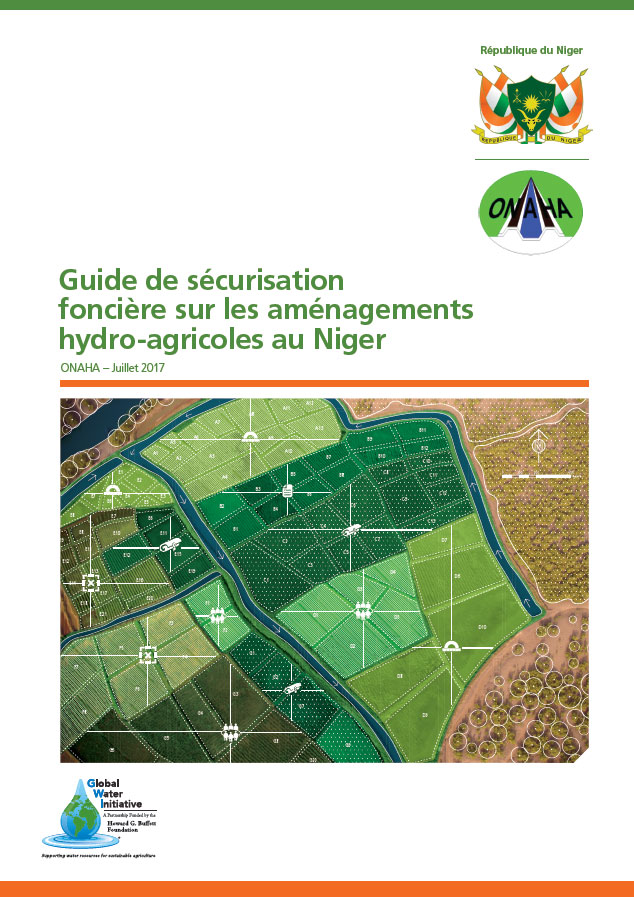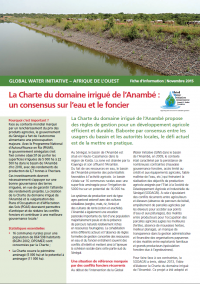
Topics and Regions
Communication adviser
Global Water Initiative (GWI)
International union for conservation of nature (IUCN)
GWI West Africa is implemented by IIED and IUCN and works in five focus countries: Burkina Faso, Guinea, Mali, Niger, and Senegal – as well as regionally. We work closely with government, donors, farmers, river basin organisations, NGOs and research communities at local, national, regional and international levels. You can find out more by reading about Our partners.
Details
Location
Contributions
Displaying 21 - 30 of 31Guide de sécurisation foncière sur les aménagements hydro-agricoles au Niger
Le Niger compte aujourd’hui 85 aménagements hydro-agricoles (AHA), qui s’étendent sur environ 16 000 hectares et font travailler plus de 40 000 exploitants. Avec la pression démographique et la raréfaction des ressources naturelles disponibles pour l’activité agricole, l’informalité de la gestion du foncier des AHA et du statut des personnes qui les exploitent est devenue problématique.
Guide to improving land tenure security in irrigation schemes in Niger
There are 85 irrigation schemes in Niger that cover around 16,000 ha and are cultivated by 40,000 farmers. The informal status of these irrigation schemes, and their occupants, has created problems due to population growth and the increasing scarcity of natural resources. Holders of traditional land rights have challenged government decisions concerning land attributions and property rights within the schemes, and have occasionally prevented construction from proceeding.
Managing land and water resources by consensus: the Anambé irrigation scheme charter
The Anambé irrigation scheme charter sets out management principles for efficient and sustainable agricultural development. The charter is based on a consensus between river basin users and local authorities. Now the challenge is to put this into practice.
La Charte du domaine irrigué de l’Anambé : un consensus sur l’eau et le foncier
La Charte du domaine irrigué de l’Anambé propose des règles de gestion pour un développement agricole efficient et durable. Élaborée par consensus entre les usagers du bassin et les autorités locales, le défi actuel est de la mettre en pratique. Cette fiche revient sur le processus d'élaboration de la Charte et met en lumière les opportunités et défis qui en découlent.
Workshop on irrigated land tenure in the Sahel (Task Force for implementing the 'Dakar Declaration')
This is the report of a workshop held on 8 and 9 June 2015 in Bamako, Mali, to present and discuss the results of a study on securing irrigated land tenure in the six countries within the Permanent Inter-State Committee for the Fight against Drought in the Sahel (CILSS) in the context of the "Dakar Declaration".
Towards security of tenure for farmers in large scale irrigated rice schemes in the Sahel
This is the Final Communiqué from a regional workshop on the theme: “Towards security of tenure for farmers in large scale irrigated rice schemes in the Sahel” which was held on 2nd and 3rd June 2014 in Bamako, Mali.
Vers une sécurisation foncière du paysan dans la riziculture à grande échelle au Sahel
Communiqué final de l’atelier régional intitulé « Vers une sécurisation foncière du paysan dans la riziculture à grande échelle au Sahel ». L'atelier s’est tenu à Bamako, Mali, les 2 et 3 juin 2014.
Securing the land rights of people affected by dams in West Africa
For a dam to successfully contribute to the sustainable development of the society, the local populations should also benefit from it. This 5 minute video examines the challenges to obtaining an equitable compensation for the people affected by the construction of large dams and defines the various steps to make sure that the farmers who were disowned of their land can have secured access to new land.
Sécuriser les droits fonciers des populations affectées par les barrages en Afrique de l'Ouest
Pour qu'un barrage contribue avec succès au développement durable de la société, les populations locales doivent également en bénéficier. Cette vidéo de 5 minutes examine les défis relatifs à l’obtention d’une compensation équitable pour les personnes affectées par la construction de grands barrages, et définit les différentes étapes pour s'assurer que les agriculteurs expropriés puissent bénéficier d’un accès sécurisé à de nouvelles terres
Land tenure conditions and the viability of irrigated rice farming
Analysis of land allocation strategies in irrigated agriculture schemes in West Africa yields lessons which can guide the design and implementation of current and forthcoming projects. Allocation of insufficient land makes the main purposes of large dam projects – to combat poverty and to increase national cereal production – more difficult to achieve. Research by the Global Water Initiative (GWI) at three dam project sites in West Africa shows that the area of land allocated per family is usually about 1 hectare (ha).






